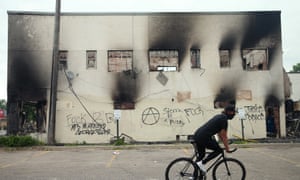If violence isn't the way to end racism in America, then what is?
Arwa Mahdawi
The uncomfortable truth is that, sometimes, violence is the only answer left
A man rides a bicycle past a burned out building Friday after a night of protests and violence in Minneapolis, Minnesota. Photograph: Scott Olson/Getty Images
A riot is the language of the unheard
When you are oppressed there is no acceptable way to fight against your oppression. You get branded “unpatriotic” for peacefully taking a knee to protest against police brutality. You get vilified for using boycotts as a non-violent tool of resistance. You get called “THUGS” when, after the murder of yet another unarmed black man by the police, you protest in the streets.
The sickening video of George Floyd being killed by a white police officer in Minneapolis, which followed the murders of Ahmaud Arbery in Georgia and Breonna Taylor in Kentucky, has sparked demonstrations across America. In Minneapolis some of the protests have turned violent: buildings (including a police precinct) have been set on fire and a Target store was looted. Donald Trump reacted by promising bloody reprisal, tweeting: “When the looting starts, the shooting starts.” Others have reacted with hand-wringing. There have been a lot of cries that “violence is never the answer!” and “rioting is counter-productive!”
But if violent unrest isn’t the answer then what is? How exactly do you go about ending police brutality and systemic racism in America? Should protesters go home and write sternly worded letters to their representative? Should they emulate Madonna and post videos of their kids dancing in protest? Should they peacefully take a knee? Should Americans simply vote Trump out and vote Joe Biden in instead? You know, the guy whose 1994 crime bill significantly contributed to mass incarceration in America? Should people patiently wait for incremental change?
“A riot is the language of the unheard,” Martin Luther King Jr said in a 1967 speech that is currently reverberating through social media for obvious reasons. “And what is it that America has failed to hear? It has failed to hear that … the promises of freedom and justice have not been met. And it has failed to hear that large segments of white society are more concerned about tranquility and the status quo than about justice, equality and humanity.”
That speech was 53 years ago and America still isn’t listening. The uncomfortable truth is that, sometimes, violence is the only answer left. We like to pretend otherwise, which is why civil rights movements are often conveniently sanitized. The women’s suffrage movement, for example, is often celebrated as “non-violent”. It wasn’t: if went through a very militant phase. “If men use explosives and bombs for their own purpose they call it war,” the British suffragette Christabel Pankhurst wrote in 1913, “and the throwing of a bomb that destroys other people is then described as a glorious and heroic deed. Why should a woman not make use of the same weapons as men?”
Don’t get me wrong, I’m not glorifying violence – that’s what the president of the United States is doing. And I’m certainly not calling for violence. I’m simply saying we must interrogate what we call “violence” and what we call “policy.” Many of the people yelling “violence is not the answer” about the riots in Minneapolis are the same people who wholeheartedly support America’s endless wars. Many of the people condemning the looters in Minneapolis are the same people who venerate billionaires. Loot a TV and you’re a dangerous criminal; loot a country and you’re an enterprising capitalist.
America has no problem with riots or looting as long as it’s the “right” people doing it. And we’re all forced to pay for this worldview: American taxpayers have paid an average of $8,000 each and over $2tn in total for the Iraq war alone, according to a January report from the Brown University Costs of War project. Which raises the question: if violence is never the answer, then why does America spend so much money on it?

No comments:
Post a Comment